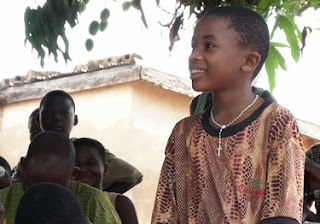
The community-led sanitation revolution in Nigeria
By Shantha Bloemen, UNICEF
BENUE STATE, Nigeria, 5 August 2013 – Women and men, just in from the fields with hoes still in their hands, and barefoot children sit in the shade under a tree. Betty Torkwase Ikyaator asks them to make her a picture of their village in a layer of sand on the ground. With pebbles and coloured paper, they place their homes, the church, the rivers, the roads and other landmarks. They don’t mark a clinic, market or primary school because they don’t have those things here in Mbanumbekem village in rural Nigeria.
 |
The sessions that teams like Betty Torkwase Ikyaator's run use
shame, humour and
enlightenment to trigger clarity among
individuals on how sanitation links to
well-being and to encourage
them to decide to act collectively in making a
change© UNICEF |
Ms. Torkwase Ikyaator asks about their toilets. A debate erupts over just how many the community of 45 households has among them. They settle on eight. Then, a member of the eight-member water, sanitation and hygiene (WASH) team from the local government authority (LGA) brings out a plate of food and asks the group if it looks tasty. Everyone agrees that the food, indeed, looks delicious.
The Assistant Hygiene Promotion Officer from the LGA team offers a community member a sample. Then he places the plate next to a pitcher of water and a small pile of, well, human excrement that was collected from nearby. It does not take long for the flies to start swarming, moving from the pile to the plate and back again.
He generously offers all the villagers a chance to sample the food. They giggle, but refuse. He offers them water from the pitcher. They giggle and refuse again. The point is made.
A commitment to toilets
Another member of the team asks some children to walk her through the village. She asks them to show her where they use the toilet. They lead her to a leafy area, near mud brick homes and a communal toilet that appears seldom used. The children point to the open area, which is enveloped by a strong stench. The children laugh, while chickens and goats amble among them, mixing their excreta with the human deposits.
Back with their parents, the children report where they have gone. The community leader reinforces the concern that something must be done about where all the villagers defecate. A lively discussion follows among the villagers, heavily punctuated with several solutions.
A committee is formed. Its volunteers agree that, over the next month, they will work to ensure that each household builds its own toilet. A record is made of each villager’s commitment to construct and use a toilet.
A trigger for change
This situation, in UNICEF vernacular, is a ‘triggering’ moment. Ms. Torkwase Ikyaator is a water, sanitation and hygiene consultant for UNICEF Nigeria. Based in Tarka LGA of Benue State, she is one of many such people fanning out across the country to help communities realize that where they defecate is a matter of life and death.
Through a mix of shame, humour and enlightenment, two-hour sessions like the one Betty and her team have conducted are designed to trigger clarity among individuals on how sanitation links to their well-being and to encourage them to decide for themselves to act collectively in making a change.
Community-led total sanitation, as this process is known, is a globally recognized concept in use across Africa to resolve the poor sanitation and hygiene practices that contribute to the illness and death of millions of children.
There were 15 communities reported to be open defecation free in 2008. Community-led total sanitation has come a long way since, having transformed the lives of over three million people in what are now more than 4,500 communities reported open defecation free.
A way of life
Ms. Torkwase Ikyaator and her team have triggered more than half of the 250 communities on their to-do list. She seems happy with the commitments and promises made in Mbanumbekem. She and the team from the LGA will be back to check on progress. The process is not preoccupied with the technical aspects of the toilet, but rather seeks to ensure that every family understands its value. Improvements can always be made at a later stage, as the use of the toilet and its value become better appreciated.
The team travel to Mbanzua community for a return visit. This community remains committed to staying open defecation free, which Ms. Torkwase Ikyaator is heartened to hear. To be certified, they need to keep their status for at least six months. “We keep on coming back to the community,” she says. “Checking in on them, giving them encouragement and supporting the process. But once they realize the benefit, especially in keeping their children healthy, it becomes part of their way of life.” Jacob Akem, a father of three, shows off his toilet, built with mud bricks and a simple plastic water container for hand-washing. He says he and his family now spend less of their income on visits to the clinic, and his children are much healthier.
Ms. Torkwase Ikyaator believes the simple and participatory process of community-led total sanitation is having a huge impact on the incidence of diarrhoea, one of the primary killers of children. But with more than 45 million Nigerians still defecating in the open, according to the 2011 Multiple Indicator Survey, she knows there is still much triggering to be done.
Follow
Unicef on Twitter











